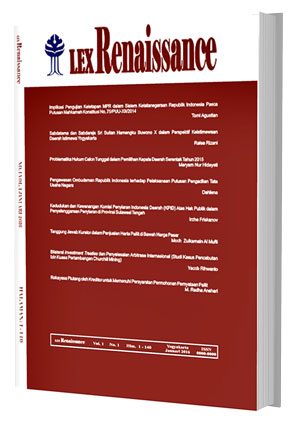Main Article Content
Abstract
Abstract
This research focuses on two issues: first, the authority of Ombudsman of Indonesia Republic (locally abbreviated as ORI) in monitoring any verdicts of civil service arbitration tribunal and second, the procedure of monitoring of Ombudsman of Indonesia Republic in encouraging the implementation of the verdict of civil service arbitration tribunal. This is a normative research in which its results conclude that: first, the law about the civil service arbitration tribunal explicitly does not mandate the Ombudsman of Indonesia Republic to do a monitoring to the implementation of the verdict of civil service arbitration tribunal but, if seen from the valid law Number 5 of 1986, Law Number 23 of 2014, Law Number 25 of 2009 and Law Number No. 37 of 2008, the Ombudsman of Indonesia Republic has an authority to do the monitoring with three reasons: i) apparatus is the target of Ombusman monitoring; ii) the action of apparatus in contradict with the legal court verdict seen as arbitrary action as a part of maladministration becomes the authority of Ombudsman of Indonesia Republic; and iii) the report to the legislative institutions and publication as the external procedures in the implementation of the verdict of civil service arbitration tribunal need to be supported with the participation of society through the complaints reported to Ombudsman of Indonesia Republic that acts as the controller of public service. Second, the monitoring procedure towards the implementation of the verdict of civil service arbitration tribunal is implemented through any demands of clarification, investigation, mediation and recommendation.
Keywords: Monitoring, Ombudsman of Indonesia Republic, verdict of civil service arbitration tribunal
Keywords
Article Details
Authors who publish with this journal agree to the following terms:
a. Authors retain copyright and grant the journal right of first publication with the work simultaneously licensed under a Creative Commons Attribution License that allows others to share the work with an acknowledgement of the work's authorship and initial publication in this journal.
b. Authors are able to enter into separate, additional contractual arrangements for the non-exclusive distribution of the journal's published version of the work (e.g., post it to an institutional repository or publish it in a book), with an acknowledgement of its initial publication in this journal.
c. Authors are permitted and encouraged to post their work online (e.g., in institutional repositories or on their website) prior to and during the submission process, as it can lead to productive exchanges, as well as earlier and greater citation of published work (See The Effect of Open Access).



